Photo: AA
Click to read the article in Turkish
No one would benefit or profit from sanctions on Turkey, President Recep Tayyip Erdoğan said today (December 11) as the country faces sanctions by the European Union (EU) and the US.
Earlier in the day, the EU decided to expand a sanctions list against Turkey at a leaders' summit in Brussels while avoiding harsher measures such as an arms embargo and suspending EU funds to Turkey.
Germany's Chancellor Angela Merkel said they would discuss an arms embargo on Ankara with the new US administration and NATO and the topic will be evaluated again at the next leaders' summit in March.
CLICK - Turkey has to deliver concrete results to regain Europe's trust, says MEP
After the EU decision, Erdoğan said "sensible" European countries "thwarted" the attempt of a few countries to have the EU put heavy sanctions on Turkey.
Ankara's "positive attitude" during this period let down some counties, the president told reporters after Friday prayers in İstanbul.
Greece and Southern Cyprus have been advocating more drastic measures against Ankara due to its hydrocarbon exploration activities in the Eastern Mediterranean.
For nearly one-and-a-half years, Turkey has been sending research and drilling vessels to the disputed waters. Greece and Southern Cyprus accuse Turkey of violating their continental shelves while Ankara claims to be protecting its and Northern Cyprus' rights.
Speaking to businesspeople via videoconference later in the day, Erdoğan said, 'Turkey's doors are open to all investors and will continue to be open."
"We have deep-rooted political and economic relations with both the United States and the European Union that neither can ever ignore or would want to lose," he remarked.
Turkey also faces sanctions by the US over its purchase of the S-400 air defense systems from Russia. The US House of Representatives on Tuesday (December 8) approved an arms sales bill that also stipulates sanctions on Turkey.
He said recent attempts to impose sanctions on Turkey would "not benefit or profit anyone."
"As Turkey, we haven't taken any steps that would harm these relations [with the US, EU]," Erdogan added.
Timeline of the Eastern Mediterranean crisisThe tension between Turkey and Greece over their right to explore energy resources in the Eastern Mediterranean has seriously escalated over the last months. The latest developments leading to this escalation are briefly as follows: On July 21, Turkey issued its first Navtex alert for Oruç Reis seismic vessel's exploration activities in the Eastern Mediterranean. On July 28, Turkey announced after Germany's diplomatic efforts that it suspended hydrocarbon exploration activities and stated that it was ready to talk with Greece. On August 6, Greece and Egypt signed a maritime border agreement. On August 10, Turkey announced that its drillship Oruç Reis would resume energy exploration in the Eastern Mediterranean. It said the ship will continue its work along with the ships Cengiz Han and Ataman until August 23. On August 14, the EU foreign miniters discussed the crisis at an extraordinary meeting, calling on Turkey to end hydrocarbon exploration activities in contested waters. On August 16, Turkey issued a Navtex, announcing that its drill ship Yavuz will continue its work exploring for energy resources off the island of Cyprus. On August 23, Turkey issued another Navtex, stating that the Oruç Reis vessel would continue its activities until August 27. On August 24, Greece held joint naval drills with the US in the south of Crete island. One day later, Turkey conducted naval exercises with Italy. On August 25, Germany's Minister of Foreign Affairs Heiko Maas visited Athens and Ankara to encourage the two countires to have direct talks. On the same day, Turkey held replenishment exercises with Italy in the Eastern Mediterranean. On August 26, US President Donald Trump had phone talks with President Recep Tayyip Erdoğan and Prime Minister of Greece Kyriakos Mitsotakis, urging them to reduce tensions and start dialogue. On the same day, Turkey and the US conducted joint maritime exercises. On August 27 and 28, EU foreign ministers met with the Eastern Mediterranean crisis on the top of their agenda. The Union's foreign polict head Josep Borrell said after the meeting that Turkey's ships might be sanctioned if they continued hydrocarbon activities. Turkey's Ministry of National Defense on August 28 announced that it intercepted six F-16 fighters planes of Greece, which it said were closing in on the area where Turkey issued a Navtex. On September 1, the US lifted the arms embargo on Southern Cyprus. On September 2, Turkey issued two Navtex alerts for Russia's gunnery exercises in the Eastern Mediterranean. It was stated that Russia would conduct exercises in two different areas that correspond to Turkey's hydrocarbon exploration activities on the east and west of the Cyprus island. On September 3, NATO Secretary General Jens Stoltenberg said, "Following my discussions with Greek and Turkish leaders, the two Allies have agreed to enter into technical talks at NATO to establish mechanisms for military deconfliction to reduce the risk of incidents and accidents." On September 4, Prime Minister of Greece Kyriakos Mitsotakis said that Greece would only enter into a dialogue with Turkey if it "stops provocations" in the Eastern Mediterranean. Shortly before this statement, Turkey's Foreign Ministry stated, "Turkey is ready to enter into dialogue with Greece without any preconditions." On September 10, military delegations from Turkey and Greece had technical talks at NATO headquarters to prevent military engagement. On September 15, issuing a new NAVTEX alert for the Chios Island of Greece, Turkey argued that Greece had militarized Chios Island in violation of the 1923 Lausanne Peace Treaty. The military delegations from the two countries held the second technical meeting. On September 17, the European Parliament warned Turkey of sanctions if it continues its hydrocarbon exploration activities. On September 18, Turkey summoned Greece's envoy over a newspaper headline about President Erdoğan. On September 21, the US stated that it does not consider the Seville Map on the maritime borders of Turkey and Greece as a document that has legal significance. On October 1, A military deconfliction mechanism has been established between Turkey and Greece. On October 2, The European Union (EU) stated after its leaders' summit in Brussels that it wanted to give a chance to constructive political dialogue but warned that all options were on the table if that was not the case. On October 8, foreign ministers of Turkey and Greece had their first meeting since the start of the crisis. On October 12, Turkey issued a new 10-day Navtex for its seismic research vessel Oruç Reis and the vessel left Antalya Port early in the morning On October 13, it was announced that Germany's Foreign Minister Heiko Maas cancelled his visit to Turkey and the EU condemned Turkey's new Navtex, saying, "The latest Navtex announcements by Turkey affecting Greek and Cypriot maritime zones are regrettable." On October 15, at a joint press conference in Paris, France's FM Le Drian and Germany's FM Maas slammed Turkey's decision to send Oruç Reis back to Eastern Mediterranean. On October 22, Turkey extended the 10-day Navtex for Oruç Reis until October 27. On October 24, Turkey issued another Navtex for Oruç Reis seismic research vessel, extending the previous navigational telex until November 4. A day later, the country's Ministry of Foreign Affairs refuted the claims of Greece that the vessel had been "conducting its activities in Greece's own continental shelf." On November 1, Turkey issued a new Navtex alert, extending the working period for three seismic research vessels, Oruç Reis, Ataman and Cengizhan, until November 14. On December 11, the EU leaders extended a list of sanctioned individuals and entities from Turkey while avoiding taking more serious steps such as imposing an arms embargo on Ankara. |
(VK)




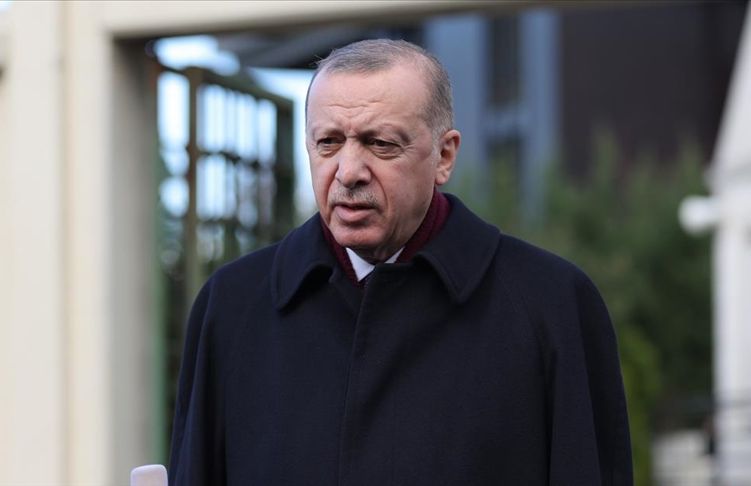
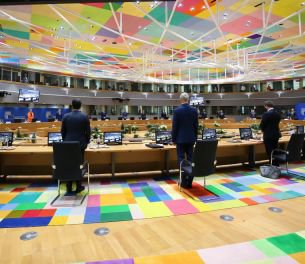
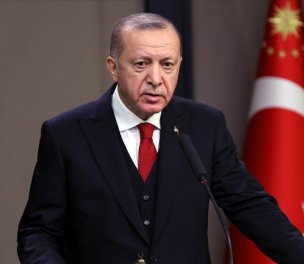
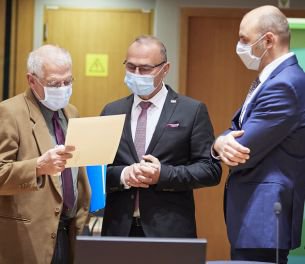
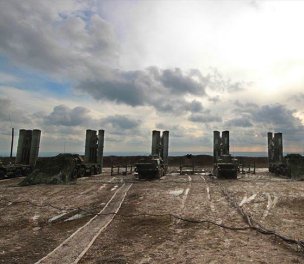
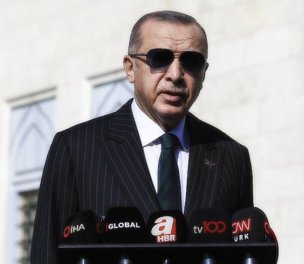
as.jpg)
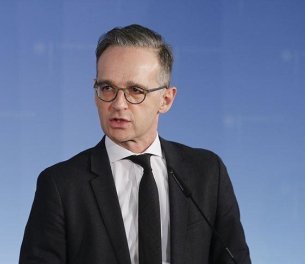
sa.jpg)